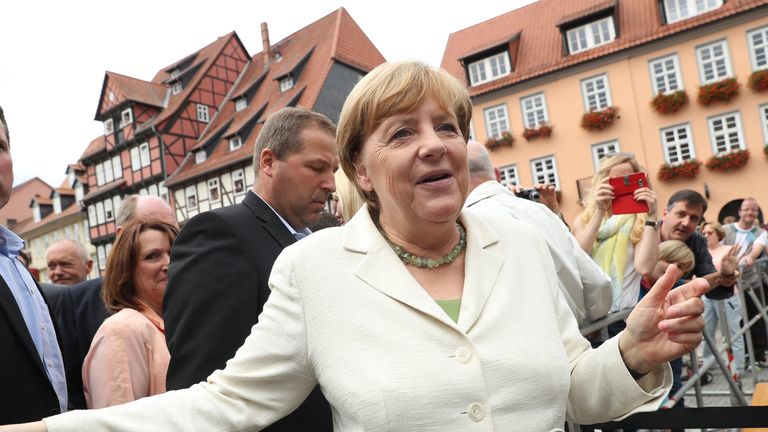The end of limbo in Germany? Not necessarily
An uptick in membership of the SDP - whose members have to approve the deal - suggest it may not be cut and dried for Mrs Merkel.
Wednesday 7 February 2018 17:49, UK
So it's a done deal in Germany? Well, not exactly.
It is an agreement in principle between Angela Merkel's CDU and the SPD.
And it has been a long time coming. The election was back in September and months of horse trading followed with the SPD leader, who had insisted he would not take part in another "grand coalition" with the long-time Chancellor.
:: Merkel set for fourth term with coalition deal
Here's the problem. The deal will have to be approved by the members of the SPD. All 460,000 of them.
Many are hostile to the idea and a notable uptick in membership in recent weeks has led to speculation that Germans are joining the party to oppose the political partnership.
Still, voting down the deal will most likely lead to another election where polls predict the SPD could emerge even more bruised than it did in September when its support dropped to 20.5%.
The nightmare scenario would be coming third behind the far-right AFD, which has been gaining ground in recent weeks. Will the membership risk it?
Here is what could swing it for the SPD leadership.
They negotiated hard and shifts in policy on health insurance, employment rights and immigration are all part of the coalition deal.
But it is the securing of prime ministries for the party which really shows it has managed to strike a hard bargain.
The crucial finance ministry will be theirs, as will the foreign ministry (which it is reported Martin Schulz will take over after stepping down from the leadership) and both will allow the SPD to be more prominent, more visible in the coalition, which may sway some in the membership.
Mr Schulz's own exit from the top position (which was confirmed on Wednesday afternoon) may also help.
The former president of the European Parliament never really gained traction with voters and last year's election result for the party was its worst in post-war history.
During the campaign, many voters criticised him for failing to make the SPD stand out from the CDU which it had been in coalition with.
So the signs, on balance, are good and lean towards the formation of a government come March.
That will be relief to the German Chancellor, whose earlier talks with two smaller parties collapsed last year leading her back to her old ally.
Investors and partners had been concerned by Mrs Merkel's failure to form a government more than four months after the election, at a time when Europe faces major challenges including eurozone reform and the UK's departure from the EU.
She also knows that - like the SPD - support for her own CDU has been slipping, suggesting there would be no majority for a grand coalition if an election were held now.
The healthcare and employment reforms she has agreed to court the SPD will prove expensive, but Germany is strong economically with high employment and rising real wages, so it will be able to weather the cost.
And for Chancellor Merkel it will likely be a price worth paying to avoid returning to the campaign trail.






